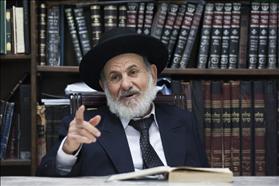A look at the year ahead
The need to renew the battle for freedom of religion in Israel
The most recent religion and state controversy of the Supreme Rabbinical Court's decision to fine a woman for not circumcising her son represents a wide array of conflicts that must be properly addressed in the next year.
11/12/2013 14:16
Tags: rabbinical court · equality in sharing the burden · Stanley P. Gold · core curriculum · circumcision

Rabbi Tzion Boaron of the Supreme Rabbinical Court in his home. Photo: Yonatan Sindel/Flash90
A serious controversy has recently surfaced in the Israeli rabbinical courts. It once again tests the boundaries of the extremely fragile religion-state dynamic. The Rabbinical Court of Appeals fined a woman $150 for every day that she does not circumcise her son, which arose as a point of contention in her divorce.
The story of this trial is a clear head-turner and has been covered in dozens of international media outlets, often quoting Hiddush’s take on the case. But the court’s decision represents an issue that is bigger than the case itself. It not only reflects commonly-cited Haredi denial of the legitimacy of Israel's civil law and judiciary, but highlights the excessive intrusion of rabbinical courts into the lives of the non-religious and non-Orthodox majority of Israeli Jews. These courts force decisions rooted in a purely religious outlook on all Israelis who are forced to divorce exclusively through religious courts. For many in Israel today it reinforces the need to renew and recharge the battle for freedom of religion and equality in Israel.
The Front Lines: Equality in Sharing the Burden
While the Knesset debates the particulars of the Equality for Sharing the Burden Law, many leaders in the ultra-Orthodox sector (both rabbis and MKs) have called on yeshiva students to ignore any military draft summons. In a committee meeting for drafting this law, MK Moshe Gafni said outright that he would call on students to intentionally break the law and go to jail. The Vizhnitz Rebbe from Bnei Brak too announced that his disciples should sit in prison rather than serve in the IDF. These and similar influential voices churning out calls to disregard Israeli Knesset law, as well as precedents of past clashes between fundamentalist Haredi leadership and Israeli civil law and courts have clearly demonstrated that prison would not be an effective stimulant towards sharing the security burden.
In addition to Hiddush's 2013 Religion and State Index, several significant studies have also been released which illustrate that equality in sharing the burden (in education, military, and workforce) hold the keys to Israel's future wellbeing.
From the beginning of the governmental and Knesset deliberations, Hiddush has played an active consultative role in the process to enact these laws. Hiddush VP for Research and Information Shahar Ilan wrote a position paper on the issue and the most recent one was sent to MK Ayelet Shaked, who heads the committee tasked with preparing the proposed law for the final vote. In the paper, Hiddush stressed that economic sanctions should be employed instead of criminal ones, a position which MK Shaked has adopted and now is attempting to legislate.
In addition to Hiddush's 2013 Religion and State Index, several significant studies have also been released which illustrate that equality in sharing the burden (in education, military, and workforce) hold the keys to Israel's future wellbeing.
A Wide Variety of Calls for Ultra-Orthodox Integration
The Taub Center for Social Policy Studies in Israel just released a policy paper on ultra-Orthodox education and employment, which demonstrates that general education has a dominant influence on employment and wages. It demonstrates that ultra-Orthodox formal education and employment is decreasing, as more men choose to study Torah, instead of studying additional practical studies to join the workforce. This increasing decline in participation is a clear concern for Israelis and supporters of Israel abroad.
In a recent interview with TheMarker business magazine, Hiddush Chairman Stanley P. Gold said that unless ultra-Orthodox students begin studying core curriculum (science, math, civics) and acquiring the skills to participate in the workforce, foreign investments will diminish and the country will ultimately suffer from the unbearable burden. The Bank of Israel released a report earlier this week which projects that unless more ultra-Orthodox Israelis receive an education that includes these core curricular studies , Israel's growth with stop and its OECD ranking will drop from 16 to 26.